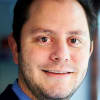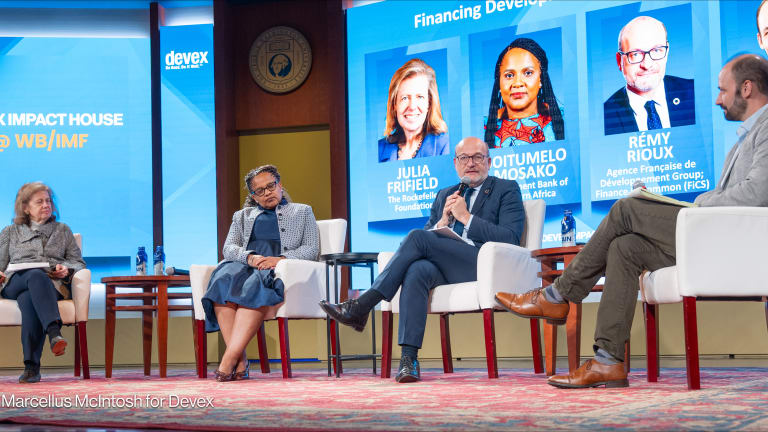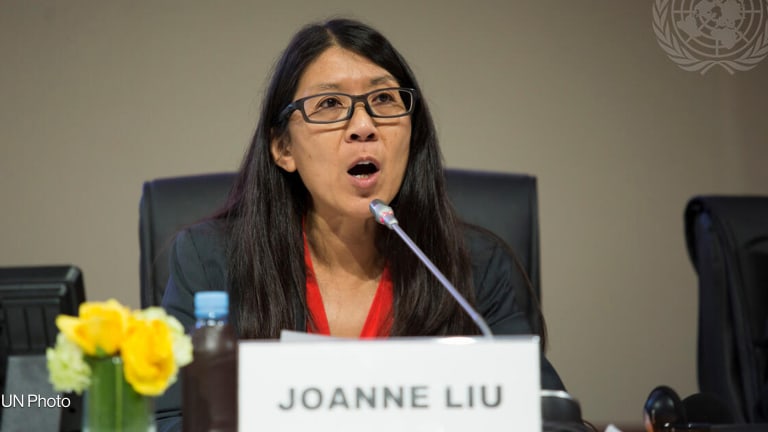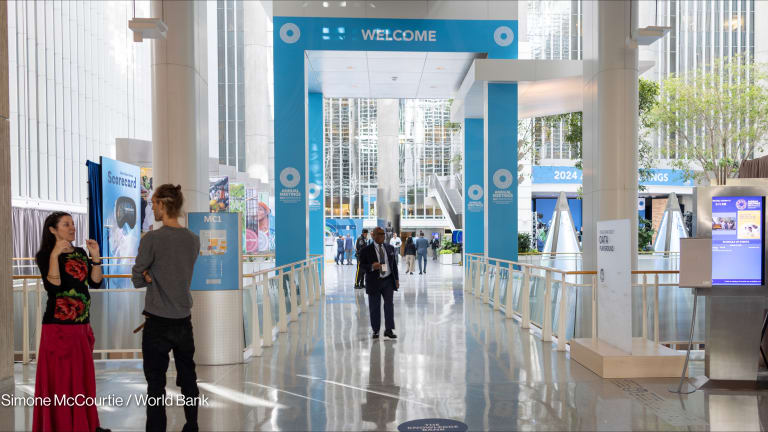
For Andris Piebalgs, the aims of a post-MDG framework are clear: It will enable everyone to live in a world that has a future, that is safer and where the challenges are manageable.
While admitting that official development assistance among the 27 European Union member states was “stagnating,” he confirmed the union’s commitment to provide its “fair share” of development assistance.
The European commissioner for development participated in a media round table, after the launch of the European Report on Development 2013 earlier this week. Prepared by external experts, ERD is an independent report, though sponsored by the European Commission and several European Union member states.
The post-MDG process, according to Piebalgs, provides the E.U. with a unique opportunity to take stock, set out its stall and indicate where it would like to influence global behavior on issues such as access to education, equity, human rights and sustainability. His task in the months ahead: to make sure that the E.U.’s voice is heard and to convince others — both within and outside the E.U. — that this approach makes sense.
Below, find more on Piebalgs’ take on the post-MDG process, as captured by Devex during an exclusive media event in Brussels.
Why do we need a post-2015 development agenda?
If there would not have been the goal on maternal mortality in the MDG agenda, for example, this issue would never have captured the policymakers’ attention. So what we can clearly see is that if there is an agreed set of goals — with limited priorities — you change the behavior of the international community as a whole and you can change the behavior of particular countries. …
I think some of these goals are simple. Each person should have a fair chance to survive and to have a fair chance of success in life. This means access to health and education. But it’s also very clear that we have two additional pillars: one is related to equity, justice, and human rights that goes beyond just survival. And the second is that all the [previous] efforts should not be destroyed because of unsustainability in the way we achieve results.
So it’s very clear that we need to build a post-2015 framework just to live in a world that has a future. We need this framework if we want to have a world that is much safer and where the challenges are manageable.
Can the drafting of the post-MDG framework be a truly global effort?
I think the drive for income equality and social equality very much comes from the developing countries themselves, because they are afraid of two major issues: one is the issue related to jobs for young people, because you can’t create a sustainable society if there are no chances of finding job opportunities for young people. Second, in a lot of countries there are a lot of internal security issues, crime issues.
So I think there’s a clear understanding — a consensus — that you need to address these issues in the post-2015 framework. The difficulty is how to frame the global goals. It’s more of an intellectual challenge than a political challenge, because on this issue we are more united with other partners.
Where I believe that we have more disagreements today is on environmental challenges, like climate change. I would still insist that we cannot neglect the climate change challenge in the post-2015 development framework … You can’t skip this question and say, “well, we’ll build a framework and then for climate change we’ll wait until we find the global consensus.” I believe the answers should be found at the same time.
The European Council will soon release its conclusions on the post-MDG agenda. Can ERD 2013 still influence those conclusions, particularly since the European Commission has already released its communication on the issue?
The basic essence of the communication was to answer whether we need one set of goals, or multiple sets of goals. I think the answer that we’ve given in the communication was to say we need to have one set of goals. And I think there is some consensus.
At the same time, the process of creating the post-2015 agenda is only starting. The report of the [United Nations’ appointed] high-level panel will be released at the end of May and it could [either] be taken on board, or forgotten. So it’s not the basis of discussion, [which is rather] to be decided at a special event in New York. We still don’t know how it will go and how it will be institutionally followed up. We just know that it will be followed up.
So the debate is only starting, especially [in terms of] governments being involved. I would expect the presentation of the ERD in a lot of E.U. capitals will create much more ambition among E.U. member countries to take this issue very seriously as the main issue in foreign policy in the years to come.
Will there be one single approach to the post-2015 MDG framework and how will sustainable development goals be included in a common position?
The U.N. system is based on the deliberations of national states. With SDG groups now starting as well, what we’re saying is don’t create another group but try to integrate the poverty and education agenda in these working groups. Don’t try to create something different. Don’t undertake too many processes. We need one process. It’s important that the special event [in New York] tries to give clarity [on this issue].
From the E.U. side, we’re saying that we need one set of goals and a simple architecture. But we’re not the only part of the world; other parts of the world might say, “No, we need a separate track for the post-MDGs, let’s focus on the business that needs to be concluded.” But in our opinion, we need to include the poverty agenda today — ethics issues, justice issues and sustainability issues. At least we have spoken up — it’s now time to convince others that it makes sense.
Read more development aid news online, and subscribe to The Development Newswire to receive top international development headlines from the world’s leading donors, news sources and opinion leaders — emailed to you FREE every business day.








